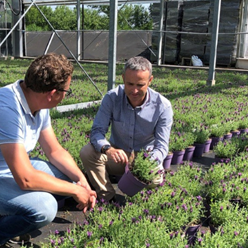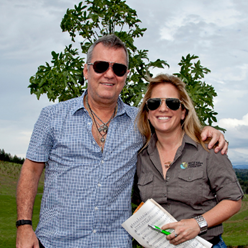Thinking about a greenlife career?
A career in the Greenlife Industry is investing in a secure future for you and the planet. If you want to contribute to a future of liveable, greener and cooler cities, promote food security and support human physical and mental health consider a career in Australia's Greenlife Industry.
Choosing your career can be a daunting process and choosing a career path comes down to what you are passionate about and doing what you love. The Greenlife Industry is passionate about plants. Careers within the industry are broad ranging from nursery production managers to television personalities. The industry is at the forefront of research and development with innovative programs and technology driving progress and helping to ensure the industry leads the way sustainably greening and feeding the planet.
A career in the Greenlife Industry is investing in a secure future for you and the planet. It is a vibrant industry where workers have the opportunity to connect both physically and digitally with the best and sometimes worst that nature has to offer. You have the opportunity to learn the basics of growing a plant and understanding plant names.
Jump in to garden design or manage a large volume production nursery where you will forecast greenlife demand.
The opportunities are endless for a career that is considered 'essential' and an industry that grew in 2020. This Careers Hub aims to give you an all the information you need about joining this fabulous industry.
Information for Students
Congratulations! You have entered the wonderful world of greenlife.
The Greenlife Industry is an amazing place to work, whether your interest is in greening our planet for a better future, a desire to work out in the open space and not confined to an office or enjoying a role where no two days are the same. Working outside with nature and in nature can have significant upsides to your mental health and well being and your physicality.
Career Advancement
For those with interest, aptitude, and a strong work ethic, career opportunities within the Greenlife Industry are endless. Whether you start in an entry-level position as a technician or use previous education to enter at a higher level there are various pathways you can take in the industry including
Because the Greenlife Industry is large and diverse, there are many segments of the industry that you can work in including Production Horticulture, Biosecurity, Retail Nursery, Permaculture, Seed Testing and Production, Plant Science and Soil Science.
Technology Focused
Working with greenlife means that you will be taking a hands on role, while you will be working with potting machines and other types of machinery, technology developments and advancements are starting to change the way the Greenlife industry looks at its businesses and how to be more effective in production. As the industry continues to lead efforts in sustainability, technology will rapidly evolve continue to be an essential component of the Industry.
A career to be proud of
Growing and watching plants, trees and shrubs (sometimes from a seedling) is very rewarding, not only are you creating and nurturing life you are also contributing to the Greening of Australia and impacting the environment in a positive way.
There are other benefits in working in the Greenlife Industry, you work as part of a team in generally a family oriented environment and offers vast opportunities to work with both your hands and mind – and of course, the opportunity to work outdoors.
If a career in Greenlife Industry is what you are looking for, do your research - visit your local nursery and ask a team member about working in Greenlife. Volunteering or gaining a part-time role in a Nursery will also give you excellent experience for your future in our industry.
For an idea of what Greenlife Industry has to offer and course requirements, look at our Greenlife career pathways.
Information for Parents and Guardians
If your son or daughter has expressed an interest in a career in the Greenlife Industry, Congratulations!
It is an exciting time in your child's life when something sparks and ignites a passion for a particular career path. Perhaps your child has been drawn to the industry because of the opportunity it offers to work outside amongst nature or the appeal is a love for nature and a desire to protect and enhance the environment.
Many are attracted to the industry because of an appreciation for and love of plants. Regardless of what has drawn your child to the field, you can have confidence that the Greenlife industry offers fulfilling and rewarding careers that make a positive impact on the world around us. Here are some reasons to be excited about the dynamic career that awaits your child.
Stable and Growing Industry
Horticulture is a rapidly expanding industry in Australia.
The Greenlife Industry is made up of small, medium and large businesses contributing a value at $2.4 billion in 2018/2019 to the Australian economy and is home to approximately 37,000 professionals.
Diversity
The greenlife industry is a significant and diverse sector investing more than $2.8 million into Research & Development and contributing 2 billion plants to the nation’s economic, environmental, physical and mental health and social wellbeing. There are many opportunities to learn, grow improve skills with careers pathways.
For an idea of what the Greenlife Industry has to offer look at our career pathways and encourage your young person to look for volunteering or part - time work opportunities with a nursery near you.
Your child will love working in the Greenlife Industry with sunshine (sometimes rain) and fresh air surrounded by greenery. We believe there is no better office office to work in!
There is so much for your child to be excited about in joining the Greenlife Industry and their career journey ahead.
For more information of what the Greenlife Industry has to offer and course requirements look at our Greenlife career pathways and watch the video,
Bring your career to life: choose horticulture or our case study of Chris Sargent's career
Information for Career Changers
Thinking or a Career change to Greenlife Industry? That's fantastic!
There are an amazing array of careers within the Greenlife Industry and, a Career change is much more common than many people realise. Making a career change can be much easier when you bring transferable skills and experience with you.
So what is Horticulture?
Horticulture is the science of plants which can also encapsulate art, technology, business, education and many, many other disciplines.
There are many career paths available to those people who are looking at a career change to Greenlife Industry and it all comes down to doing what you love.
If your career is based on your passion, no matter what studies you have undertaken or experience you have from a service oriented role to a science or engineering based role and everything in between, there are many avenues you can explore within the Greenlife Industry.
There are roles for:
- Designers
- Scientists
- Engineers
- Retail
- Administrators
- Data Management
- Lab Technician
- Information Technology
- Writing and Photography
If there is a role you are interested in undertaking, research the role and ask questions as to whether your prior experience is perfect for a career change to the role. In some cases an introduction to Horticulture upskilling course is beneficial however, you will undertake on the job training specific to that role. Your future Greenlife employer will advise you on what is required.
Information for Careers Advisers
Imagine a student who is enterprising, adventurous, ambitious, decisive, energetic, enthusiastic, confident, and optimistic.
Someone who is future focused and who wants to make a difference.
Then imagine them working in an industry where they meaningfully contribute to creating sustainable and liveable cities and suburbs, support the physical and mental health of Australians and underpin food security in Australia.
What if we told you plants are the answer to everything (well, almost everything…).
The industry needs professionals who want to re-wild our cities and suburbs, improve the environment and feed the nation.
Do any of your students have these traits?
Then Greenlife might be the pathway they were looking for!
Greenlife Industry Australia have included some helpful downloadable material about a career in Greenlife, its pathways and some case studies to tell you all about our diversity, what we do and how we got there.
Brite Pathways - Information on disability transition from school into a job or training (Broadmeadows, Victoria only)
A Brite Pathways Course helps young people with a disability to transition from school into a job or training, preparing them for success in the next stage of their lives.
Brite Pathways work closely with each young person (and families) to deal with barriers and develop a tailored action plan.
Our goal is to make sure that young people graduating from the Brite Pathways Course are ready to move into open employment or further education opportunities that fit their interests.
It’s a two-year, full time course that involves:
- skill building (life skills and employment)
- work experience
- education
- health and wellbeing.
For more information visit Brite Pathways
Information for Employers
There are a number of things that you need to know when hiring and training an apprentice or trainee.
We go through the differences between an apprentice and trainee, the requirements and your responsibilities.
There are many types of training available through TAFE, Higher Education and Registered Training Organisations (RTO’s) from certificates to a master’s degree.
Entry level roles will normally be a Certificate II (Traineeship) or Certificate III (Apprenticeship) although a Certificate III can be studied as a course without the apprenticeship component.
Apprenticeships and traineeships are formal on-the-job training arrangements between an employer and an employee that can lead to a nationally recognised qualification.
What is the difference between an apprentice and trainee
Apprentices develop a skilled trade, such as Production Nursery Tradesperson, Electrician, Plumber, Mechanic and Cabinet Maker. When an apprentice completes their apprenticeship successfully, an apprentice becomes a qualified tradesperson.
Trainees train in a vocational area, such as office administration, hospitality, information technology. When a trainee completes their traineeship successfully, the trainee receives a minimum of a Certificate 2 in their chosen vocation.
An important first step when managing an apprentice or trainee is to recognise that they may have little or no experience in a work environment.
Firstly, you will need to acquire an Australian Apprenticeship Support Network (AASN) provider .
Every Australian apprentice must be signed up into a formal training contract, typically within 14 days of being employed. This ensures that everyone is aware of their responsibilities, and the apprentice or trainee is registered correctly with the government. An Australian Apprenticeship Support Network (AASN) provider can help with apprentice or trainee's paperwork, conduct your sign up and lodge the contract of training with the State or Territory government. They can also assess your eligibility for incentives and if your apprentice or trainee is entitled to any additional support.
Apprentice or Trainee Training Contract
Apprenticeships and Traineeships operate on the basis of a formal training contract between you, the training institution and your apprentice / trainee. The contract outlines your obligations to provide training and the qualification your apprentice / trainee is working towards achieving. This contract can only be cancelled by mutual consent or, if only one party applies for cancellation by the relevant state training authority after considering the circumstances. Training contracts must be registered with your state or territory training authority.
The training contract will follow the apprentices'/ trainee's training through the life of their apprenticeship/ traineeship. Training contracts form the course units delivered by the training organisation and lists the competencies of the units taught within a formal training session.
It is a very good idea to view the training contract regularly as this will identify the subjects taught or about to be taught - it will also highlight the competencies obtained during formal training.
Training contracts are signed off by the employer in conjunction with the apprentice on a quarterly basis.
The responsibility of the Employer
- To ensure the apprentice is attending formal training sessions and completing assessment tasks
- Supervision of the apprentice on site at all times
- Oversee the units being delivered through formal training and practically training your apprentice on the work site for these tasks to be reinforced.
- Communicate with the apprentices or trainee about their formal training
- With an apprentice, the employer should be paying for the tuition fees of the apprentice or reimbursing when fees are due
The responsibility of the Apprentice
- Attend all scheduled formal training session and complete both practical and theory-based assessment tasks
- Communicate with employer about the units being covered during formal training.
Australian Apprenticeships training can be on-the-job, off-the-job or a combination of both. Your training provider can negotiate the apprentice attendance and study pattern with both the apprentice and the employer.
When taking on an apprentice or trainee, the employer is agreeing to train their apprentices or trainees in the skills they need to become qualified. This means someone needs to supervise the apprentice or trainee, to show them how to perform tasks to the standard needed and to guide them to achieve that standard.
When training an apprentice, the person training and supervising the apprentice needs to have obtained the qualification they are training.
Taking the time to supervise and manage the apprentice or trainee
The employer will need to make sure the supervisor of an apprentice or trainee is able to spend time working with their employee. As part of this time spent with the apprentice or trainee, the supervisor should:
- demonstrate skills and explain clearly how to perform them
- watch the apprentice or trainee practice skills and correct them if needed
- monitor progress against the Training Plan and related training provided by the Registered Training Organisation (RTO) with workplace tasks
- help the apprentice or trainee work with other staff or clients
- provide feedback across the work and training of the apprentice or trainee
If you are unsure how to train an apprentice, trainee or employee; GIA have developed a Train the Trainer PowerPoint presentation to help you hone and develop those skills.
GIA Train the Trainer PowerPoint
Supervision
For an apprentice or trainee it is important to provide supervision and support for the term of their contracted work period and is also a legal requirement under the industrial arrangements, the Apprenticeship and Traineeship Act, 2001 and the training contract.
You should also be supervising any new employees to your business until they can perform tasks on their own. A supervisor needs to:
- give clear and consistent instructions on work tasks
- guide and support
- provide feedback and encouragement
Competencies Assessment
As an employer or supervisor you will be required to sign off your apprentice or trainee’s training plan with relation to their competence in completing a task.
You will receive a copy of your apprentice or trainee's training contract on a quarterly basis with the competencies the training provider deems to be achieved. Your responsibility is to then verify the apprentice or trainee’s skills and knowledge, comparing the evidence to a set of industry-based standards and ensuring that standards are met.
The apprentice or trainees’ training contact should be updated every quarter by the training provider and signed off by the employer.
The apprentice or trainees full training contract will be provided at the beginning of the training with dates allocated for units (subjects) of learning. It is handy for you to reference the training dates and follow up with on-the-job training for these subjects, it also helps you understand what your apprentice or trainee are currently studying and whether they are taking in the required knowledge.
Another bonus is, if your apprentice or trainee is competent in a particular field of study then you can start allocating more tasks to your apprentice or trainee once you are satisfied with their abilities.
Induction to the workplace
A good induction is crucial in providing a basis on which the apprentice or trainee can build effective workplace relationships and have a clear understanding of what is expected of them and should include at least:
- an overview of the business
- the role of the apprentice or trainee in the organisation
- expectations of all parties
- occupational health and safety procedures and issues relevant to the worksite
- basic work rules, work conditions and provisions under the award
- an introduction to key personnel
- who to go to if there is a problem
Meeting workplace safety and Fairwork conditions
As an employer, you must
- pay award rates
- have current workplace insurance
- pay superannuation benefits to staff where required
- ensure workplace health and safety laws are adhered to and
- ensure you are compliant with all COVID requirements.
Finding an apprentice or trainee
To find the right person, you can:
- recruit someone you know or who has been recommended to you
- advertise the position in a local paper or online
- get in touch with local employment agencies
- speak to your local school careers adviser
- talk to your local Australia Apprenticeship Support Network provider or
- contact your local group training provider
For more information about employing an apprentice the Fair Work Ombudsman has a Guide to taking on an apprentice here
Top 10 Industry Employability Skills
When entering the workforce it is more important than ever that you are well-equipped or have an understanding of important skill sets employers are looking for. These are not necessarily taught to you at school and in most cases life experience, family and friends may be the avenue for you to seek understanding of these skills.
1. Digital Literacy
In today's digitally advanced world, every career uses technology. The more you know about technology, the more appealing you will be to a prospective employer. As you prepare to enter the workforce, check out the industry you are interested in, research and understand the technologies used within that industry. This will help future employers to see your interest in their industry through your tenacity and highlights you willingness to be trained
Examples of technology used in the Greenlife Industry include plant production software, mobile irrigation and solar sensors, robotic potting machines, apps, benchmarking tools and more.
2. Problem Solving Skills
Perhaps the most important skill you can develop before getting that dream job is problem-solving skills. In todays work environment you will need to adapt to all sorts of issues and problems that may arise in your day-to-day role. Problem solving skills are extremely important to be able to assess what is happening and find and alternative solution to the problem that presents itself. Practice your critical thinking skills by considering and open ended problem and identifying all the possible solutions for it. Critical thinking is an asset every employer is looking for.
Here are a few problems you might face in the Greenlife Industry - water is expensive, so how can I ensure I have the most efficient irrigation schedule for my plant lines? OR I don’t have all the plants my client wants. What can I do to fulfil this order?
3. Global Citizenship
Because of advanced technology, our world is now smaller than ever. In your role, you may work with people all over the world. You will need to have an appreciation, tolerance and understanding of other cultures. Being able to communicate and create a working relationship with people from other cultures can make you invaluable. You can develop your global citizenship skills through travel and connecting with people from a variety of cultures.
4. Entrepreneurship
While not all of you will start your own business straight out of school, having entrepreneurial skills will help you succeed in today's workforce. Entrepreneurs are motivated, have forward thinking attitudes and are change agents. This means you are someone who is motivated, thinks about the bigger picture and has ideas. Employers are looking for employees with forward-thinking attitudes and who can initiate change and have ideas of their own. If you can demonstrate you are forward thinking and can make difference to the company, an employer will certainly look at you more favourably.
5. Curiosity and a Love of Learning
Another of the most important skills needed for your future role is curiosity and the love of learning. Employers are looking for well-rounded individuals in their workplace and curious people who love to learn are always an asset. Research the company you are applying to and during the interview demonstrate your desire to learn by asking questions about pages on their website . You should be constantly pursuing knowledge. What do they say about learning, if you’re not learning something new every day, you are not living!
6. Communication Skills
Communication skills are perhaps equally as important as problem-solving skills. No matter how great your ideas or thoughts are you need to be able to communicate them effectively in an interview or the workplace. You will need to be able to demonstrate your skills through writing and speaking. Some roles will list these skills as core competencies. If you are not confident in your writing and speaking and this is a key element of the role you are looking at, practice until you feel comfortable as these skills will develop over time.
7. Adaptability and Cognitive Flexibility
Two highly important skills for future jobs are adaptability and cognitive flexibility.
To be successful, you need to be able to adapt easily to change, many companies are always changing the way they do things, and they need workers who can adapt and roll with the changes. Having cognitive flexibility is also an advantage. But what does this mean? Having cognitive flexibility allows you to analyse a situation and come up with alternative plans to meet your goals or requirements, this means you are able to change your thinking as quickly as new problems and situations emerge.
Looking at a situation from many angles and formulating the best plan is very similar to when someone says, ‘you are good at thinking on your feet’.
8. Accessing, Assessing and Analysing Information
Technology gives you the ability to have a wealth of knowledge at their fingertips. Today, it is not only about what you know, but what you can find out. Having the skills to access any information you may need to solve a problem is a definite asset to any company. But accessing the information is only the start. The ability to assess and analyse information and dig out what is relevant to your role or project and understand how to use it is also highly important. These skills will set you apart.
9. Self-Knowledge and Emotional Intelligence
One of the most important skills is self-knowledge and emotional intelligence. First of all, what is self-knowledge? Being self-aware is about understanding yourself, your strengths and weaknesses and where you may need to make changes to perform at your best.
Emotional awareness means being able to recognize emotions, understand the feelings associated with those emotions and understand what you think and do as a result. This helps with interactions within the workplace and how you handle certain situations. It also helps you make connections, form bonds and working relationships with co-workers. Making strong connections is essential in any industry as most roles rely on working with others. Employers are looking for those people who can form bonds and work well with others.
10. Don’t Stress
If there are some skills that you don’t have, don’t stress! Not everyone will have all of these skills.
Our list of employability is skills is thrown it out there, so you have an idea of what employers are looking for in a candidate. In most cases, you will already have most of these skills and just need to refine certain qualities. But knowing is better than not knowing, am I right?
Good luck in your search!












